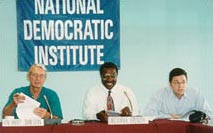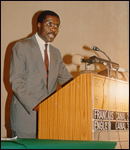|
African Anomaly: An Election Up for Grabs
By Howard W. French
March 2, 1996
Wherever President Nicephore D. Soglo has gone the last few days,
whether pressing the flesh in roadside campaign stops or dancing briefly
during a festival in the coastal city of Ouidah, he has been eagerly
greeted by supporters with cries of "five more years."
But what makes Mr. Soglo's run for re-election extraordinary in a
continent where 18 or more national elections will be held this year
-- the most since thedawn of African independence from European colonialism
nearly 40 years ago -- isnot its infectious, feel-good atmosphere. Instead,
in contrast to scores of rigged presidential votes on this continent
since the late 1950's, no one here is sure what the final outcome of
Sunday's election will be. In fact, no one knows whether the incumbent,
who faces six rival candidates, will even survive the first round. If
Mr. |

Former US Congressman Harry Johnson,
Chris
Fomunyoh and Tim McCoy
briefing an NDI delegation to the
Beninese election in 1996. |
Soglo were to lose, it would be virtually the first time a sitting
president has lost power at the ballot box in sub-Saharan Africa, other
than the historic election that ended white minority rule in South Africa
in 1994.
In countries like Central African Republic, Madagascar and Congo, sitting
presidents lost elections only after being stripped of most of their
powers. That power is truly at stake is not the only novelty here either.
In a continent long bedeviled by ethnic rivalries, Benin has been able
to put them aside. Instead, the campaign has focused to a great degree
on issues that would seem more familiar to Westerners: The candidates
have debated the role of the state in shaping the economy, how much
should be spent for social services, and the appropriate role for the
president's family in the life of the nation. |
| "They are all running on fairly straightforward questions,"
one Western diplomat said. "Privatize, don't privatize, more of this,
less of that. It is really rather remarkably about the issues." For
its size, this tiny country of 5.5 million people has had a striking
record of setting examples for its far larger neighbors. And many observers
from both the outside world and elsewhere in West Africa, where a wave
of democratization that began at the start of the decade appears to
be petering out, are eagerly watching how Sunday's vote will turn out.
In the past 30 years, Benin seems to have been near the head of the
political curve for Africa. A military coup here in 1963, led by one
of Mr. Soglo's uncles, was one of the first of many army takeovers that
transformed Africa's political landscape in the early independence years
and for years made Benin one of the continent's most unstable states.
A Marxist-Leninist dictatorship was established in 1972 by Mr. Soglo's
principal electoral opponent, the retired general Matthieu Kerekou.
That made Benin one of the continent's first communist states. Benin
set its latest precedent in 1990 when it organized the so-called National
Conference, which peacefully stripped General Kerekou of his powers
after 17 years of ruinous, repressive rule. It appointed Mr. Soglo,
a veteran World Bank official, as interim Prime Minister, and set the
stage for the country's first democratic, multiparty elections in 1991,
which Mr. Soglo won. One by one, this country's neighbors -- Mali, Niger,
Congo and Central Africa Republic -- began organizing democratic transitions
modeled on Benin's experience. Longtime dictatorships were swept from
power in all of these countries. |
| However, the reform process began faltering when governments that
were strong allies of France in countries like Gabon and Ivory Coast
pre-empted calls for national conferences by holding multiparty elections
that international observers widely regarded as rigged.
Since then, many of Africa's elections -- like one last week in Equatorial
Guinea that President Obiang Nguema won with 99 percent of the vote
-- have been cynical affairs. These votes are intended to give entrenched
dictators a veneer of respectability while exposing the leadership to
little or no political risk. Other elections, like one just held in
Sierra Leone, have taken place in the midst of long-running civil wars
and have been watched over by armies reluctant to surrender power to
civilians. "In Benin we have democratic institutions that have been
functioning for five years, including a Constitutional Court that has
already proven its autonomy and an independent electoral commission
that is unique in francophone Africa," said Christopher
Fomunyoh, director for West Africa of the National Democratic
Institute, a private American organization that promotes democracy. |

Chris Fomunyoh speaking
at a Conference on
Democratization
and Election in Africa,
held in Cotonou, Benin |
| "This is going to be a true test of whether these institutions
can survive and grow, encouraging other countries to take the democratic
path established by Benin, or whether there will be a rollback," said
Mr. Fomunyoh, who is leading a delegation of 17 observers here. "Whatever
happens, Benin will be a determining factor in the intellectual discussion
that is already under way about whether democracy can survive in Africa."
Since a military coup overthrew an elected Government in Niger last
month, Benin has been surrounded by undemocratic neighbors -- from military-ruled
Nigeria, Africa's most populous nation, to even smaller Togo, where
President Gnassingbe Eyadema has ruled with an iron fist and the sympathies
of France for three decades. In an editorial this week, L'Horizon, a
newspaper here, said of this situation, "The Atlantic Ocean is our only
sure neighbor now." For his part, Mr. Soglo acknowledges the enmity
his country's democratic turn has earned him. "When I went to Japan
for the coronation of the Emperor, another African leader, who I will
not name, said to me: 'You are Soglo, the one who is creating so much
disorder for Africa." |

Chris Fomunyoh and conference
organizers Francois Kedomedi
and Taofiki Aminoc of Benin. |
In an interview today in the National Palace here, Mr. Soglo, 62, said:
"I have grown used to the insults." What is more, the President contended,
neighboring countries that he would not name have been arming and training
troublemakers and sending them to Benin in the last year. He said that
he suspects it was such outside agitators who fired an anti-tank weapon
at a newly built international conference center in November, just days
before Benin was to hold a biannual summit of French-speaking nations
there. Rather than back down, Mr. Soglo has made a campaign theme both
of the country's democratization under his leadership and -- an even greater
novelty -- his record in implementing a classic program of World Bank-style
economic reforms. |
| In many other countries where such reforms have been
carried out, come election time, the leaders -- from Robert Mugabe of
Zimbabwe to Jerry Rawlings of Ghana -- have sought to distance themselves
from the liberalizing prescriptions of international lenders and to
renew their nationalist credentials. Road-building and other new construction
have taken off during Mr. Soglo's tenure, transforming Cotonou, which
had been a desolately sandy and potholed place.
"Soglo paid the functionaries and the functionaries, for once have
been doing their work," said Francois Agbodo, a restaurant-owner in
Ouidah. "Before, nobody got paid and nobody worked." But Mr. Soglo's
critics have also seized upon economic issues in their campaigns. Mr.
Kerekou, for example, whose socialist model during his years in office
was widely considered here to have been an economic failure, has nonetheless
gone on the attack, appealing to national pride to say that Mr. Soglo's
privatization of bankrupt state companies has gone too far. To many
observers, it appears that Mr. Kerekou's popularity derives mostly from
the respect he earned for gracefully retiring from power at the demand
of the 1990 National Conference and living modestly ever since. Mr.
Kerekou is believed to enjoy strong support in his native northern Benin.
Mr. Soglo's other main rivals, like Adrien Houngbedji, a former National
Assembly president, have concentrated their criticisms on the need for
social services, which these candidates say have been forgotten in the
pursuit of an economic growth rate that is officially estimated at about
6 percent. Others have harped effectively on the high profile of Mr.
Solgo's wife, Rosine, who enjoys a degree of influence that many compare
to Hillary Rodham Clinton, and of other members of the President's family,
who are often seen at official functions or who frequently do business
with the state. Mr. and Mrs. Soglo often appear at state functions wearing
twin outfits. The President raised eyebrows, diplomats say, at the Francophone
Summit here, when he introduced his wife to 40 heads of state and government
before mentioning the French leader, Jacques Chirac, whose country financed
the gathering.
Along with Mr. Kerekou, Mr. Houngbedji is widely considered among
the most likely candidates to survive the first round and to face Mr.
Soglo in a runoff two weeks later. For some observers, however, the
combination of Mr. Kerekou's high name recognition and regional support
and Mr. Houngbedji's effective introduction of social issues as a campaign
theme make it uncertain that the President himself can survive the first
round. The President's party, Benin Renaissance, lost control of the
National Assembly last year. "What is so refreshing here is that anything
can happen in this election," said one European diplomat of Sunday's
vote. |
 
|

